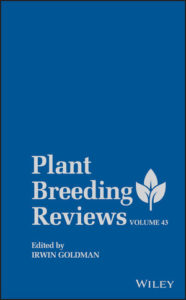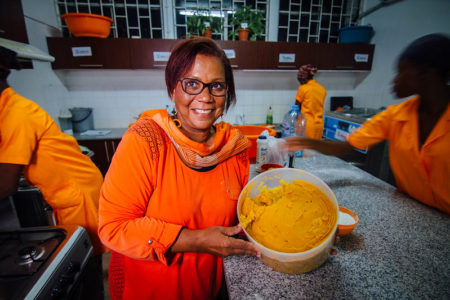In its December 2019 issue, the journal Plant Breeding Reviews has recognized International Potato Center (CIP)  scientist and 2016 World Food Prize co-recipient, Maria Isabel Andrade, for her contributions to the field for her important work on sweetpotato.
scientist and 2016 World Food Prize co-recipient, Maria Isabel Andrade, for her contributions to the field for her important work on sweetpotato.
The article describes Andrade’s professional journey starting in the island nation of Cape Verde, where she attended primary and secondary school. A scholarship from the African American Institute opened the door for Andrade to study agronomy in the United States, and, in 1989, she enrolled at North Carolina State University where she earned a degree in plant breeding and plant physiology, specializing in the yield stability of sweetpotato.
From these beginnings, Andrade developed her research interests in technology transfer, breeding, seed systems, and the improvement of value chains, marking the start of a 32-year career in agriculture. Calling Mozambique her research home, Andrade started with the International Institute for Tropical Agriculture in 1996 as regional cassava and sweetpotato agronomist for the Southern Africa Root Crop Research Network. Then in 2009, she joined CIP to manage the Sweetpotato Action for Security and Health in Africa project, bringing together breeders from Malawi, Zambia, Angola, South Africa, Madagascar, and Mozambique, with a focus on breeding drought-tolerant sweetpotato varieties.

Under her leadership, Andrade and her team halved the time required to breed new varieties from eight years to four. By 2009, her work had led to the release of 41 new varieties, 30 of which were pro-vitamin A, orange-fleshed (OFSP) varieties.
Andrade’s work was also highlighted for her productive collaboration with many institutions including, Hellen Keller International, the Alliance for a Green Revolution in Africa, Mozambique’s Institute of Agricultural Research, and the Bill & Melinda Gates Foundation. Through these partnerships, Andrade and others made significant advances in developing local breeding capacities and enhanced adaptation of improved sweetpotato varieties by resource-poor small-scale farmers. Part of the success was due to effective public awareness activities—for example, using the color orange for all promotional materials—to complement the scientific findings.
Andrade’s success with sweetpotato breeding earned her worldwide notice through the 2016 World Food Prize, an honor she shared with Jan Low and Robert Mwanga from CIP and Howarth Bouis from HarvestPlus, for advances in biofortification.
In response to the article, Andrade expressed gratitude for her colleagues at CIP and abroad, saying,
“I believe one day the world will become ‘orange’… With commitment from all of us at CIP and the global research community, we will achieve zero hunger for all.”
Plant Breeding Reviews is a leading academic journal in the field of breeding and plant genetics. The full version of Andrade’s biography and career accomplishments is available in volume 43.
